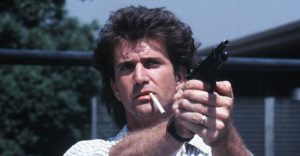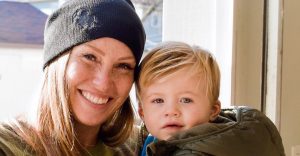Ruth Wilson Interview: True Things

Ruth Wilson leads True Things as Kate, an ordinary woman with a dissatisfying life. Based on the novel True Things About Me by Deborah Kay Davies, the film explores Kate’s renaissance as she meets Blond, a handsome, edgy figure played by Tom Burke. Through her spontaneous relationship with the mysterious man, Wilson’s character discovers what she truly desires in life and breaks free of the societal restraints placed on her. True Things is written and directed by Harry Wootliff with Wilson and Jude Law among its producers.
Wilson’s acting career has seen her adorn both the stage and the screen. Her noteworthy TV roles include Alison Bailey in The Affair, Alice Morgan in Luther, and the titular character in Jane Eyre. Wilson also played Mona Juul inthe 2021 movie Oslo. She most recently appeared as Mrs. Coulter in His Dark Materials. A 2015 Golden Globe winner for her work on The Affair, Wilson was recently named Member of the Order of the British Empire (MBE) for services to drama.
Wilson spoke with Screen Rant about portraying Kate’s journey in True Things, what she learned from stepping into the character’s shoes, and much more.
Ruth Wilson Talks True Things
Screen Rant: How were you approached to star in this adaptation of the novel, and how did you get involved on the producing end?
Ruth Wilson: I was doing a play with Jude Law, and he was being sent lots of material to his production company. One of which was this book called True Things About Me. He read it, and he said, “Ruth, I think there’s something in this. Could you read it? And if you do, let’s make it together.”
I read it. I did think there was something in it, so we both bought the rights of the book, and that was the start of the process. We then had to get a writer on board, etc. So, that’s how we found the material and how I started producing it.
Speaking of the book, what was your experience like translating Kate from page to screen?
Ruth Wilson: Our film is quite different from the book, actually. It took a number of years in development, this film, and Harry and I were both really interested in the start of the novel, the initial phases of infatuation and love, how that almost has an obsessive quality to it, and it can feel like an addiction. We were really interested in exploring that through this character of Kate. On the page, and certainly in the book, there’s an atmosphere of that. There’s an amazing sense of addiction and obsessive quality around this character Blond. The book goes a little darker, in terms of getting a bit more violent, and we were wanting to stay within this vein of what was interesting about infatuation.
What came out in the book as well was her extraordinary humor. Even though she’s a victim, or at the will of this man in some way, she has the ability to see the world quite clearly, and she’s quirky. The book made me laugh out loud, and it moved me. I also thought it was a really internal and subjective lens on this experience, which happens not just for women, but for men too. It’s quite a universal theme of a rite of passage relationship when you fall in love with someone that’s really not right for you, and it’s very hard to see wood from trees, and you’re kind of blind to the reality. It’s about exploring why we become blind to reality in those times.
What elements or nuances to Kate did you add in the film that weren’t drawn from the book?
Ruth Wilson: Quite a lot. We moved off the book quite quickly. Once you start developing, you start really concentrating on the script itself. Harry [Wootliff] was working with me, and she was writing it too, so she would just sit with me and start writing things that I did as Ruth into the script. She was kind of drawing and pulling the character toward me more than I was moving toward Kate. That’s kind of in the humor. It’s kind of in the chaos.
I am a bit chaotic sometimes. You might not imagine, but I am — losing keys all the time, that sort of stuff. So, certainly the chaos of Kate and the slight lost in an imaginative brain, which I have to do with my job, but that’s also part of me. They’re in the book as well, but those are certainly areas that Harry wanted to write more of and lean into because I was playing that role. Like I said, it’s not such a positive end in the book, so we wanted to find Kate’s empowerment as well, and those things of hers, which are her quirks, and also her strengths.
Kate’s vulnerability lies at the center of this story. What was it like to really tap into the inner workings of a person and make that the focal point of the film?
Ruth Wilson: I think what was different about this film was it was so intensely viewed and observed by the camera. This was going to be such an internal expression of who this woman was that you don’t often have the camera that close the whole time watching your every thought and feeling. I think Kate is really vulnerable. What I loved about this piece was that Kate is vulnerable, and she’s flawed, and she makes bad mistakes and choices. But, she’s also really driven, and she’s the one that drives this relationship. She’s the one that gets his number. She’s the one that pursues him. She’s the one that eventually gets him, and then she’s also the one that lets go of him when she no longer wants him. I thought that dualism of this very vulnerable woman seemingly at the will of this man but actually the one driving that dynamic is really fascinating, honest and truthful.
If you’re obsessed, you’re going to find every way to get to this man, so I just thought that was a really interesting complexity to her that yes, there was vulnerability, but it’s also strength and driven desire to get what she wanted. Those things were playing, and I had to find that within the character and in the writing, as well as in the performance. I never saw her as a victim. I always thought she was quite clear about what she wanted, and even though to everyone else that seemed completely wrong, to her, she was clear about it. Eventually, I think the point of change is when she gets to Spain in the last quarter of the film, and that’s when she starts to see him differently and starts to really own her life in a different way. That required a slightly different performance from me because suddenly I wasn’t seeing him in this romanticized light.
It’s interesting how Kate’s struggle revolves around her lack of desire for what society expects of a typical middle-aged woman — like work, marriage, and children. In your eyes, what does True Things say about this societal standard of a woman’s fulfillment that is obviously far from the truth?
Ruth Wilson: Yeah, that was one of the points. I was really intrigued about why we fall for someone and obsess about someone that’s clearly not right, and is it because of societal pressure, and the expectations of what you should be doing at this stage in your life, or what your friends or your parents want from you, or how best to fit in? Or, is it an amazing act of imagination to believe that someone can be the person you want them to be when they clearly can’t? What is it that makes us go to that place and continue to pursue someone that’s not into it like you are? I think there is something about expectations for women.
Having a partner; having someone to share your life with is obviously wonderful and what everyone kind of seems to want to do once in their life. But what comes with that—being a mother, or being married—I think there is sort of a strange expectation on women that that is what happiness is, and it’s not always the case. We should have choice around that and more choice. Lots of women don’t in lots of different cultures. It’s kind of that’s just what they have to do. So, I think that is a statement on it. It’s a statement on that she doesn’t fit into that expectation. She’s trying to and she can’t. Instead, she chooses this man that kind of sabotages any hope of that expectation in a way. She uses him to get out, and get away, and free herself.
This relationship clashes with Kate’s everyday life, which of course she wasn’t happy with in the first place. To what extent do you feel like Blond either ruins her life or improves it?
Ruth Wilson: I think he improves it. I think that for all his toxicity, he also sees something in her the others don’t. He sees her quirk, her humor. He identifies it and makes her feel special. Even if he perhaps doesn’t end up meaning it or whatever else, for her, she feels like she’s being seen for the first time in some way. Before that, her parents, everyone wants something from her that she’s not able to give, and it’s not her. I think she chooses him to sabotage that opportunity or that potential. Being with him is not going to make her like her friend or her mom. It’s not going to make her mom happy. She’s almost doing the opposite of what they want for her, and she’s trying to shoehorn it into what they want. I think he frees her, essentially. I think she’ll probably go on and make the same mistake with someone else. Maybe one, another go, two goes, but I think it’s definitely got her out of the world.
It was interesting, we staged it and filmed it in a place called Ramsgate, which is on the east coast of the U.K. In the majority of the film, she’s living on the coast, but we never have shots of the sea. We didn’t have her looking out wistfully across the sea. She was so close to freedom in a way, but she couldn’t see it. She was so trapped in her own life and claustrophobic in her own life that she couldn’t look to where she could escape to, and it was only through him and his invite to Spain that she actually gets out of the world that she’s in. So, I think he is her freedom.
What did you learn from playing Kate in True Things and living in this character’s shoes?
Ruth Wilson: As a performer, it felt the most “me” that I’ve ever played. It felt like the most honest performance that I’ve ever done because the camera was witnessing me close up, and I wasn’t trying to tell a story; I was just being observed. That, at first, was very vulnerable making, but I found it incredibly liberating by the end. Like Kate, I felt that “me” was interesting enough. Prior to that, I played characters and go, “Who would want to watch me? I’m playing a character who’s much more interesting that I am.” But actually, in some ways, I was like, “No, I am as interesting to watch.” It’s OK to be just me because it’s being observed.
Going back to how you were involved in producing True Things, can you describe what that experience was like to take on this role in a feature-length film for the first time?
Ruth Wilson: I loved it. I come from theater, so I love working and collaborating with everyone involved in telling the story. The opportunity to work with the writer from the get-go, the opportunity to then work with all the creative heads in creating that character, but also the world, and then in the edit, the press, and the marketing — I’ve really loved it. It’s given me so much experience outside of that, you know, actors get such a small experience of filmmaking. So I’ve really enjoyed it, and I’m going to do more.
At this point in your career, you’ve accomplished so much from winning a Golden Globe, to receiving an MBE, and establishing your own production company. Do you have an idea of what you’d like to achieve or do more of in the future?
Ruth Wilson: I don’t know. Ideas sort of spiral. I’ve got a little inkling of running a building, which is like a theater space — which I’d quite like to do. I don’t know when and how that would happen, but I always go back to my roots in theater. It’s what our most ancient tradition as humans is, telling stories, and I think for young people to have a space where they can tell their stories, I just think it’s really exciting. So, one day, maybe. Maybe not near future, but in the future, maybe that’s an aim of mine.
True Things Synopsis
Kate is sleepwalking through life when a chance sexual encounter with a charismatic stranger awakens her. High on infatuation, she finds herself inexplicably drawn to this mysterious man. Hoping he will provide the escape she so desperately desires, she embarks on an emotionally dangerous journey that slowly begins to consume her.
True Things is currently playing in select theaters.




















